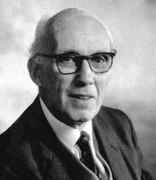Person: Rado, Richard

Richard Rado was a German-born British mathematician who worked on combinatorics and graph theory.
Mathematical Profile (Excerpt):
- Richard, his parents' second son, made a decision while at school to choose between being a concert pianist or a mathematician.
- Rado's thesis, entitled Studies on combinatorics, earned him a doctorate in 1933.
- They had one son, Peter Rado, born in 1943.
- Rado was interviewed in Berlin by Lord Cherwell for a scholarship given by the chemist Sir Robert Mond which provided financial support to study at Cambridge.
- Rado entered Fitzwilliam House, University of Cambridge, and completed a second Ph.D. in 1935 under Hardy's supervision on Linear transformations of sequences.
- While at Cambridge Rado was influenced by many mathematicians working there at the time including Hardy, Littlewood, Hall, Besicovitch and Bernhard Neumann.
- Rado also worked with Heilbronn and Davenport and, at around this time, he began to correspond with Erdős.
- In 1936 Rado was appointed to the University of Sheffield where, after Mirsky was appointed in 1942, the two became close friends.
- In 1947 Rado moved to King's College, London, moving seven years later to a chair at the University of Reading.
- Rado's work covered a wide range of mathematics but his most important work was in combinatorics.
- These important combinatorial results were in the area of Hall's theorem, Ramsey's theorem, the Rado selection principle, matroids and theory of transversals, and partitions.
- Rado received many honours for his contributions.
- Rado was the kindest and gentlest of men.
Born 28 April 1906, Berlin, Germany. Died 23 December 1989, Henley-on-Thames, Oxfordshire, England.
View full biography at MacTutor
Tags relevant for this person:
Origin Germany
Thank you to the contributors under CC BY-SA 4.0! 

- Github:
-

- non-Github:
- @J-J-O'Connor
- @E-F-Robertson
References
Adapted from other CC BY-SA 4.0 Sources:
- O’Connor, John J; Robertson, Edmund F: MacTutor History of Mathematics Archive
